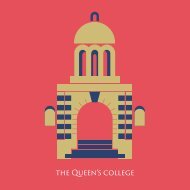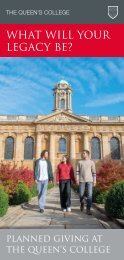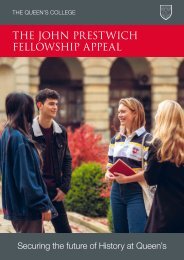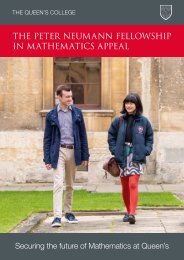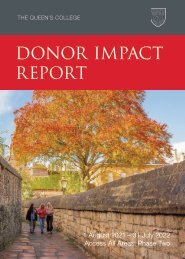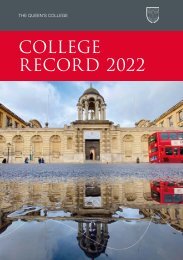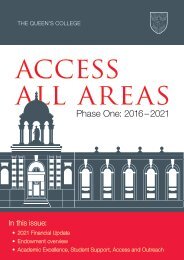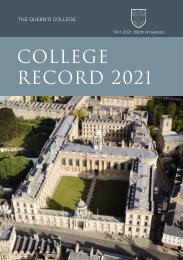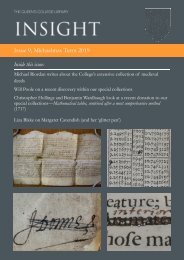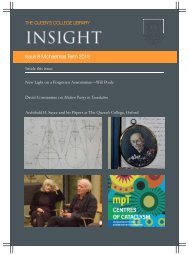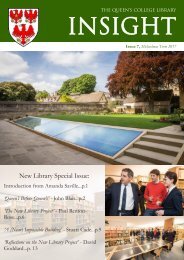The Queen's College Record 2023
You also want an ePaper? Increase the reach of your titles
YUMPU automatically turns print PDFs into web optimized ePapers that Google loves.
Reports and <strong>College</strong> Activities<br />
Credit: John Cairns<br />
Conor O’Brien (History)<br />
This summer saw Queen’s say goodbye to most of our<br />
pandemic crop of undergraduate historians, who, I’m glad<br />
to say, did amazingly well, with a bumper number of firsts<br />
announced in July <strong>2023</strong>, despite all the disruption those<br />
students had to put up with. I’m particularly interested in<br />
this year group because I arrived at Queen’s as a tutor at<br />
the same time that they arrived as students. Hopefully their<br />
excellent results bode well for me!<br />
Certainly, I was glad to see a number of articles published arising from my larger work<br />
on early medieval Christian political thought: ‘<strong>The</strong> Christianization of Late Antique<br />
Political Discourse: Reflections on the Irish Evidence’ appeared in Journal of Late<br />
Antiquity, 15 (2022), while ‘<strong>The</strong> Origins of Royal Anointing’ was published in Studies in<br />
Church History 59 (<strong>2023</strong>) only a few brief weeks after the first anointing of a monarch<br />
in many decades. I was very pleased that this article won the Ecclesiastical History<br />
Society’s President Prize (the second time I have won this prize); it is now free to<br />
read online via the Cambridge University Press website.<br />
Chris O’Callaghan (Medicine)<br />
In the laboratory, we have used a single cell multiomic<br />
approach to study the effects of oxidised low density<br />
lipoprotein cholesterol (‘bad’ cholesterol) on the human<br />
immune cells involved in atherosclerosis. Using this<br />
experimental approach, we studied thousands of cells and<br />
determined, for each cell individually, which genes were<br />
expressed by analysing their RNA, and what changes in<br />
their genome programming alter their behaviour by analysing their DNA configuration.<br />
This has generated very interesting data and new hypotheses about disease<br />
mechanisms that we are starting to test. My colleagues and I were pleased to be<br />
awarded a large five-year grant to study further metabolic aspects of cellular function<br />
in atherosclerosis. I published a clinical trial testing whether a set of interventions,<br />
largely based on simple technology, can empower people with kidney disease to<br />
reduce their salt intake—it can and it’s cheap, so we aim to roll this out more widely.<br />
Over the last few years I have had the privilege of editing a textbook of medicine,<br />
Medicine for Finals and Beyond, and was pleased to see this in print and in use<br />
by students.<br />
18 <strong>The</strong> Queen’s <strong>College</strong> | <strong>College</strong> <strong>Record</strong> <strong>2023</strong>




